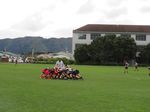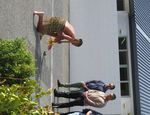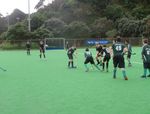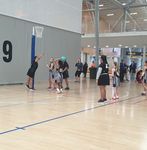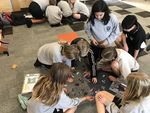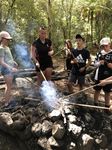Te Kura ō Hinepohatu - Maidstone Intermediate School
←
→
Page content transcription
If your browser does not render page correctly, please read the page content below
Te Kura ō Hinepohatu
OUR MISSION . . .
To inspire positive self-belief in learners, to think critically and contribute meaningfully in an
increasingly changing world.
Web: www.maidstone.school.nz Email: admin@maidstone.school.nz Phone: 04 5283094Kia ora koutou
Welcome to Maidstone Intermediate School. Our school was established in
central Upper Hutt in 1970 and has undergone many changes to arrive at the
modern learning environment we see today.
Maidstone Intermediate caters for emerging adolescents; students aged from
11 -13 years, Years 7 and 8. The needs of students in this age group are
unique and exciting - a time when students are beginning to view the world and
their part in it with new awareness and understanding. Maidstone Intermediate
offers a caring, stimulating and challenging environment within which to flour-
ish.
Our aim is to
‘inspire positive self-belief in our learners’
we encourage learners to understand their learning and be confident in their ability to learn
‘to think critically’
our learning programmes develop the skills for critical thinking
‘and contribute meaningfully’
a variety of opportunities are provided for students to contribute in leadership, sport, cultural pursuits, and
the arts
‘in an increasingly changing world.’
we know the world is changing and we aim to equip our students to understand and feel at ease with
these changes.
Do take some time to read of the opportunities we offer students, in this prospectus. We warmly invite
you to be part of our Maidstone learning community.
Nga mihi nui
Mary O’Regan
Principal/Tumuaki
As a parent of four children who have all attended Maidstone Intermediate, here
are some of my thoughts on the strengths of Maidstone.
All our kids took part in all sorts of activities, from Leadership Options (Tuck Shop,
Referees, Assembly Compere), to Cultural (Kapa Haka), to Performing Arts (Band,
Dance Splash) to Sports, and the Options Programme.
The academic programme is based on the Maidstone Curriculum, which has been
developed from the NZ Curriculum framework specifically to cater for the needs of
early adolescents. There are many facets to the programme which recognises individuals’ needs, includ-
ing extension programmes e.g. Otago Maths, ICAS competitions, Maidstone Athletic Development Pro-
gramme etc.
Learning takes place in light and inviting classrooms designed with future technologies in mind. All levels
of ability are catered for, with individual programmes being developed for each child; designed to ex-
tend their own learning capabilities.
At a syndicate level, all children take part in camps, and trips to a number of exciting venues around the
region. The friendly rivalry between classes within a syndicate, and between syndicates, encourages the
kids to get involved in lunchtime sports.
The ‘Team Work and Values’ camp each alternate year encourages kids to take leading roles within the
school, and teaches them life skills that they can take with them when they move on to college. At Col-
lege, my children have become captains of their respective sports team/s, and are active members of
their classes, due to the confidence they gained at Maidstone Intermediate.
Heather CleggFROM THE CHAIRPEOPLE OF THE
STUDENT REPRESENTATIVE COUNCIL
Kia ora, we are the head students of the Student Representative
Council (SRC) for 2020. SRC is just one of the many amazing lead-
ership opportunities at Maidstone Intermediate school.
SRC is where students have the opportunity to have input into the
running of the school. When you come to MIS, you may be nervous,
anxious or even excited. But we can assure you that MIS is filled
with friendly faces, and you’ll make plenty of friends who will share Jack Mason (Lead )Laura Clark (Deputy)
your interests. You will also meet great new teachers who will sup- Danyelle Johnson (Lead)
port you, and provide you with new learning opportunities.
At MIS, our motto is to Motivate, Inspire and Succeed. This means, we are all helping to support each
other as we grow and learn. You just know you will be supported by your teachers and students, and
other friends you have made. Everyday, when you see these friendly faces, you will know it’s going to be
a good day!
SRC is not the only learning or leadership opportunity. There are many other opportunities - like the Spe-
cialist Tech and Arts programmes. You might work in the tuckshop, or be a referee for Lunchtime Sport.
What about extending yourself in academic areas? At Maidstone Intermediate we have a special pro-
gramme called Friday Academies. Academies is a great way to extend yourself in areas from Maths and
Science, Literacy, Foods, Performing Arts, Maidstone Athletic Development (MAD) and the William Pike
Challenge.
Another programme at MIS is the Options programme. Options is a great way to learn things you would
not typically learn in the regular classrooms. Every year, we are always excited to see what’s on offer -
there are so many great topics it’s really hard to choose!
You are probably wondering, what about sport? If you’re sporty then check out the Sports page in this
prospectus - there’s a lot to choose from!
We look forward to welcoming you to our kura. Nau mai haere mai, haere mai ki te kura ō Hinepōhatu.
Jack Mason and Danyelle Johnson
SRC Class Reps
At Maidstone Intermediate, parent support is appreciated and encouraged.
Research tells us that supporting your child with their learning greatly increases their chances of leading
successful and happy lives. We know that an ongoing and effective partnership with the home is in the
best interests of your child. We believe it is essential to the success of the school.
There are many ways that you can support the school, such as assisting with educational visits, reading
tutoring, coaching a sports team, or standing for the Board of Trustees.We encourage our students to take an active role in their learning, setting goals and evaluating their own
progress. Our aim is to set students up to be life-long learners and this requires a sound understanding of
learning processes as well as the content of the learning programmes.
The New Zealand Curriculum identifies five Key Competencies that, when mastered, set students up to be
successful in life and learning. These Key Competencies are specifically taught and practiced within the
learning programmes. They are:
Thinking - creatively and critically making sense of ideas, experiences and information
Managing Self - self motivation and a ‘can do’ attitude; resourceful, resilient
Relating to Others - interacting effectively with a variety of people with different points of view
Participating & Contributing - being actively involved in communities; local, national, global
Using Language, Symbols and Texts - competence interpreting words, number, images
The Maidstone learning programmes include a ‘blended learning’ approach. Traditional learning tools
such as pen and paper, text books, and exercise books are used, along with a variety of digital devices,
software and on-line programmes. All of these tools have value; it’s a case of using the best tool for the
task. Students are encouraged to bring their own devices where possible.
The learning programmes have a sound base of core curriculum areas. These include Reading, Writing,
and Mathematics. Proficiency in these areas ensures our students are set up for proficiency in all other
areas.
Physical Education is highly valued at Maidstone. A comprehensive programme is taught by all class-
room teachers. These programmes include all the strands of the Physical Education programme; Personal
Health and Physical Development, Movement Concepts and Motor Skills, Relationships with other People,
and Healthy Communities and Environments. This programme is well balanced with a Fitness pro-
gramme and a large variety of Sports opportunities.
The Learning Programmes at Maidstone Intermediate are based on Levels 3 and 4 of the New Zealand
Curriculum. Students who are learning outside these levels are catered for by adapting or extending the
programmes. Extra learning support is provided by our very able teacher aides who work alongside the
teachers providing for students who find areas of learning challenging. Our very able students have a
variety of opportunities for extension throughout the year and this supplements the in-class extension pro-
vided by the teacher.
“The Technology and Arts Programme teaches us skills about different things, that may lead to other
things later in life”—Grace
“There are so many opportunities at Maidstone, and the teachers are great”—JordanSPECIALIST LEARNING AREAS: The Arts: Visual Arts gives students the opportunity to generate their ideas in a variety of artistic forms both transi- tional, and digital. They are introduced to the elements, principles, and techniques of Visual Arts which enables them to learn about Art in their own and others’ culture through exploration, representation, im- agining and creating artworks. Students are introduced to the creative process which enables them to broaden their ideas and imagination through research. The Performing Arts programme is designed to give students the opportunity to learn the beginning skills of music, dance and drama. Through an integrated curriculum approach, students explore the crea- tive process; translating ideas, thoughts, and feelings into original pieces of artworks and experiences. Teacher tuition on the keyboard and other sound experiences, allow students to manipulate sound in the music programme. In dance, they will improve their techniques, poise, self-confidence and creative abil- ity to respond to a range of stimuli. Drama offers the students opportunity to explore their world through the ‘pretend’ in meaningful and fun contexts. Technology: Materials Technology at Maidstone provides the students with opportunities to explore a wide range of resistant materials. They will learn about the properties of these materials and their suitability for use. Over the course of the cycle, students are introduced to many different tools including a laser cutter, and are shown how to use them correctly and safely. All work in Materials Technology follows a Design Brief, and by Year 8 student will be designing, modifying and producing products for an identified need. Students use rubrics to identify their next learning steps and are given on-going feedback to ena- ble them to reach the specified outcomes. Design Technology—Codebotiks is a programme that incorporates elements of both computer coding and robotics. Students are introduced to algorithms, the essential first step understanding needed to learn coding, and shown how this can be applied to solve challenges using droids and apps. Students learn to understand how technological systems use control to allow for the transformation of inputs to outputs. Put simply, program the robot correctly and it will complete the task. Food Technology. Learning in the Food Technology classroom has a focus on introducing the students to the Technology Process. Students will use the Tech Process to assist them in designing, making and modifying food products to meet a brief. The students will write a brief based around the need for healthy food for students that has been identified by them. Students will explore foods from other cul- tures and make products that they find new and exciting. Students will be taught food safety and hy- giene, culinary skills and nutrition. FURTHER LEARNING OPPORTUNITIES Learning Languages: Maidstone students have the opportunity to learn a language of their choice within their syndicate programme. Students appreciate that learning a new language extends their linguistic and cultural understanding. Equipping our students for living in a world of diverse peoples, language and culture, is important for their future. Options Programmes Personal Development Options A wide range of activities are provided for students to select from. They vary from year to year, and may include: Movie Maker, Soft Toy Making, Laser Whakairo, and a ‘curriculum extension’ activities eg: Virtual Business, Rocket Science, Creative Writing with a twist, How the Body Works and Body Workouts. Leadership Options We offer a range of leadership options eg: Student Representative Council, Performing Arts Leaders, Referees, Rangatahi Maia, and Tuckshop Managers Cultural Options A number of Cultural Options are offered eg: Kapa Haka, and Kapapasifika, Stu- dents perform at assembly, and are regularly involved in Artsplash and other events such as Showquest and local Cultural Festivals.
Music Tuition & Bands Programmes One day each week, students can be withdrawn in pairs or small groups for eight lessons, at a cost of $90 per term. Instruments can be hired, and tutors are brought into the school. Instruments include ukulele, bass guitar, guitar, drums and keyboard. We have also started tutoring singing this year. Students have the opportunity to audition for one of the school bands in Term 1. Once established, from Term 2 on, there is a charge for being in a band. Education Outside The Classroom (EOTC) All students attend an EOTC camp held at the beginning of alternate (even) years. Activities are aimed at increasing confidence and expertise across a variety of areas e.g. teamwork, facing challenges, develop- ing positive relationships with others, living the values of the school, and successfully coping with leader- ship responsibilities. On alternate (odd) years, a series of Physical Education day trips are planned by each Syndicate. 2021 is not a camp year. Te Reo Maori & Tikanga Maori The school provides the opportunity for all students to learn Te Reo both as a language option and in classroom lessons. We have a strong Kapa Haka Group and Rangatahi Maia who play important roles in the life of the school. Parent Tutors Each year the school invites parents, caregivers and members of the Maidstone community to support children with their reading. Tutors complete a training programme run by a Literacy Expert. Students read for 15 minutes four days a week, and tutors focus on a variety of specific targets depending on the child’s needs. The aim is to provide students who are reading just below their expected level with a ‘boost’. Home Learning Teachers provide relevant and interesting tasks for their students to complete at home. Homework may be an extension of the classroom programme, further practise with a learned skill, or preparation for new learning. Work set should take no more than 30-45 minutes per day, four times a week. These tasks are frequently done on-line. Parents are asked to support their child’s learning by taking an interest in these tasks, and ensuring they have a quiet space to complete their work. Having discussions with your child about their learning will encourage them to achieve their best. Reporting to Parents We believe it is important to keep parents informed about their child’s learning; both with the progress they are making, and their next learning steps. Twice during the year teachers, students and caregivers have the opportunity to meet together formally, to discuss the child’s learning. Written reports are sent home at mid-year and again at the end of the year. You can expect informal communication from the classroom teacher as well via email or phone. Parents and caregivers are encouraged to contact the classroom teacher if they have concerns or questions.
Sports Programmes Students have the opportunity to participate in a huge range of sporting activities in their 2 years at Maid- stone Intermediate: Inter-Intermediate competitions Maidstone Intermediate has a strong tradition in Inter-Intermediate sporting competitions.The competitions we take part in are: Athletics, Rugby Sevens, Cross Country, Football, Hockey, Rugby League, Volleyball, Netball, Basketball and Touch Rugby. We also take part in other invitational competitions, including: Baseball, Aerobics, Swimming, Table Tennis, Indoor Cricket, Softball, Waterpolo and Ki O Rahi. School competitions We hold an athletics day for all students in Term 1 as well as cross country in Term 2. Every second year we also hold a swimming sports. At these events students compete for their syndicate and earn qualifica- tion to the relevant Inter-Intermediate sporting competitions. Alongside these events we also hold a Hauora fun sports day, where the students and their whanau take part in a day of fun filled activities where the focus is on being active and having fun. Lunchtime sports Lunchtime sports are very competitive at Maidstone Intermediate. There are games nearly every week and all classes take part. This year we have also introduced the challenge flag. The challenge flag is held by a class and they defend the flag every time they play against another class. This is a very prized pos- session! After school sports There are several sports you can get involved in in out-of-school time. They include: Wednesday night Basketball, Floorball and Flippaball. Maidstone Athletic Development Programme (MAD) This programme is designed for students who have been identified as being gifted and talented in physical education/sport. The purpose is for participants to further develop their physical skills and enhance fitness levels through ‘sports modules’ using outside expertise. Students go through an application process to be included in this programme.
Saturday Netball Maidstone intermediate also has a very proud tradition in competing in Saturday Netball. Every year trials are held during Term 1 and teams are organised with a coach and a manager. Netball coordina- tion is well organised and we typically field 8 to 10 netball teams every year. We are always very com- petitive. The 8a and 7a teams also represent us at the Inter-Intermediate competition. Aims Games The NZCT AIMS Games is an international sporting championships held annually in Tauranga. The competition is targeted at elite athletes wanting to compete and experience the highest level of compe- tition for intermediate aged students. This is an amazing opportunity and a privilege for any student to participate in. Students can trial to be selected for our school AIMS teams or complete an application for individual sporting codes. Visit www.nzaimsgames.co.nz/ for more information.
Maidstone Intermediate takes advantage of the Government Donations Scheme. The only cost to parents/caregivers is a $15.00 charge for the take home compo- nent from the Materials Technology Programme. Costs for cultural and sports events are separate and charged only to those involved. No other costs will be requested throughout the year. It is requested that the full $15.00 payment be made at the beginning of the school year. The school account number is 12 3142 031 9918 00. Please use your child’s surname and first initial as a reference. Payment can also be made at the school office by EFTPOS or Credit Card. If giving money to your child to make payment a ‘drop box’ is located in the school foyer. Place the money in one of the envelopes provided, fill out the requested information, and place the envelope in the drop box. DIGITAL TECHNOLOGIES—BYOD (Bring Your Own Devices) Classrooms are resourced with a range of digital technologies but Maidstone Intermediate is al- so a BYOD school. This means students may bring a device to school to use for appropriate learning activities. Devices are connected to the school wifi. A chromebook is recommended but other devices such as laptops, ipads, etc are acceptable. It is desirable but not essential to have a device, and students are not disadvantaged by not having one. See the enclosed pamphlet for more information. GETTING IN TOUCH Behaviour Issues Should there be concerns about a student’s behaviour these will, in the first instance, be ad- dressed by the classroom teacher. If the issues escalate or persist, they will be referred to one of the Deputy Principals. Messages It is our goal to provide clear lines of communication between home and school. Our school office is open from 8am through until 3.30 pm. Our office staff: Terri Corbett, Sandra Smith and Heather Harker, will do their best to ensure that all inquiries are answered promptly, and information and mes- sages are passed on to students, class teachers or senior management. To help us with this, it would be appreciated if parents/caregivers could ensure that all after-school arrangements are confirmed each morning prior to your child leaving for school. Enquiries Parents are welcome to visit the school at any time during the year to discuss their child's school work or welfare. We ask that you do not visit your child or teacher during class time, but come directly to the school office, where an appointment can be organised for you. Contact Telephone Number/Addresses Please keep the phone contact numbers and addresses for your child up-to-date. This makes it easier if the school needs to contact you or your nominated emergency contact person. Information may be updated by email to the school on admin@maidstone.school.nz Email (Please keep these up-to-date) We use email to help ensure good lines of communication are established with home. You will be provided with the email address of your child’s teacher, syndicate leaders and senior man- agement. We would also like to have parents’ email addresses so we can contact you, and also send home school newsletters and other correspondence without these notices being lost in the depths of your child’s bag!
Daily Notices and Events Calendars On the home page of our school website, www.maidstone.school.nz you will find a Google calendar. This is a combined Calendar that incorporates the Daily Notices (in orange print) and our School-wide Events Calendar (in blue print). The Daily Notices are shared with the students daily at approx 10:40 (prior to morning tea). These notices are usually relevant to the daily running of the school, informing students of meet- ing times and venues, cancellations, rosters, practices etc. Our School-wide Events Calendar shows school-wide events that are often planned well in advance. We do our best to update the events calendar as and when dates come to hand. As it is a shared calendar with staff, some events are relevant only to teachers. If in doubt as to whether an event pertains to you or your child you are welcome to contact the school office for further detail. We hope you and your child will find these calendars a handy source of information when planning family activities etc. GENERAL Attendance If your child is going to be absent please ring the school (04 5283094) use the absence line option) before 9.00 am. Leave a message on the absence line answer phone stating your child’s name, room number and the reason for the absence or send message through the web- site “absence” portal. Stationery A list of stationery requirements for the year will be available with the Student Induction Booklet handed out to students when they come for their Classroom Placement Visit. We do not sell stationery through the school. Information about on-line purchase and delivery from various companies will be on our website in December. Visitors A Visitors Pass is required by anyone entering the school grounds; so please report to the school office when visiting the school. This ID enables students and staff to know you are a legitimate visitor. Visitors and Contractors are also asked to sign in on VisTab when they arrive, and when they leave the school. This policy is necessary to ensure the safety of students while at school. If you need an item delivered to your child, this will be organised by office personnel.
HEALTH INFORMATION
Sick Children
We ask that parents do not send children to school when they are sick.
Should a child become ill at school and need to go home, parents will be
contacted. The school is unable to provide transport home for sick chil-
dren unless there is no other option available.
Medication
Medication cannot be kept in classrooms. Parents/caregivers must fill in the Medication
Form at the office if their child is on regular medication. All medicines will be kept in the
office and administered as set out on the signed form. If the medication or dosage changes
the parent/caregiver needs to complete and sign a new form.
Counsellor
The school has an experienced counsellor, who works with individual students who have
behavioural and social issues that impact on their learning or wellbeing.
Students can be referred by teachers, peers, parents or themselves
Public Health Nurse
The Public Health Nurse is available to assist with any health problems—
phone 04 570 9964.
Dental Nurse
The school Dental Nurse is available through the Mobile Clinic and can be contacted on
0800 Talkteeth (0800 825583384).
LOOKING AFTER YOUR PROPERTY
Occasionally school property and equipment is accidentally damaged or broken. Where
damage is deliberate, or there has been a flagrant disregard for care, students will be asked
to contribute to the cost of repair or replacement. Personal property (such as sports equip-
ment, games etc), should not be brought to school. Such items are not covered by our
insurance, and the school accepts no responsibility for damage or loss.
Cellphones & Electronic devices
Students are not permitted to have cellphones in class or in the school grounds. All student
cellphones are put into the class cellphone lock up when the student arrives at school. Bus
cards, money and other valuable items may also be put into the lock up. The teacher must
ensure the key is kept secure. A spare key is available for relievers from the office. The
phones and other items put in the lock up are then returned to the students at 2.50 pm.
“There are heaps of opportunities to do with music such
as band, use of the band room and music tuition”.—
Jillian
“There are so many new opportunities available at
Maidstone that I thought I wouldn’t have until I was at
College or older”.—SophieStudents will wear school uniform to and from school, and during school hours. While wearing
our uniform they are representatives of our school and are therefore expected to adhere to our
values and the school rules that govern behaviour. School uniform is to be kept clean and tidy
and worn correctly with no added items.
Maidstone PE/sports uniform will be worn by students while participating in PE lessons and
sports activities, and when representing Maidstone at Inter-school events. Students are
expected to have the PE uniform with them every day.
A Maidstone hoodie is available to purchase once a year as a fundraiser for the teams going to
the AIMS Games. This hoodie is worn with the PE uniform only.
The school jacket and long pants may be worn during the second and third terms when the
weather requires it. Students are expected to clothe themselves appropriately for the tempera-
ture of the day. Sunhats are compulsory outside in Terms 1 & 4. This must be the Maidstone
school hat.
Jackets. Students may wear their own black jacket in terms 2 and 3.
Shoes are to be plain black with black soles. Socks are plain black or white crew length.
Sports shoes and socks may be worn for PE and sport.
Jewellery & Make-up
Students are not permitted to wear jewellery except for a watch and/or one pair of small, plain
stud earrings. If necklaces, chains, or bone carvings are worn, they must be kept out of sight.
No responsibility is accepted for jewellery that is damaged or lost. Students are not permitted
to wear make-up or nail polish while at school.
PURCHASING UNIFORM—information sheet included in the Prospectus Folder.
NZ Uniforms stock the Maidstone Intermediate uniform from their School Uniform
store, at 92 High Street, Lower Hutt 5010. Shop hours are 9am-5pm weekdays and
9am-1pm on Saturdays. Sunday closed, with extended hours in January.
The uniform is also available for purchase online at http://www.nzuniforms.com.
You can contact NZ Uniforms Store on 04 2820129 or email them on
lowerhutt@nzuniforms.com for more information.
Hats can be purchased from the school office during the school year.
FULL SCHOOL UNIFORM PE/SPORTS UNIFORMOur students travel to Maidstone using a variety of methods of transport including private car,
bus, bikes, scooters and by foot. The following guidelines are provided to ensure that they not
only travel safely between home and school but also that their bikes and scooters are not dam-
aged or stolen.
Private Car
We ask that all drivers adhere to the parking guidelines when dropping children off or collecting
children from Maidstone. Please don’t park over driveways, on yellow lines or on bus stops.
When dropping your children off or picking them up please make sure they are aware that they
should use the pedestrian crossing to cross the road—not run between cars.
Cyclists
Students living within cycling distance of the school should use the clearly
labelled “Safer Routes” and keep off Fergusson Drive as much as possible.
The River Road is not to be used. Cycles must be in a road-worthy condition,
and the wearing of helmets is mandatory. Children are not permitted to ride
on the footpath. They will not be permitted to ride home without a helmet; cy-
cles will be held at School for parents to collect. Please make sure you go over the road rules
with your child as the distance to school may be much further than they have been riding previ-
ously. Cycle parking is provided at the school, but all bicycles should be locked securely to the
bike rack (combination rather than padlocks are recommended); pumps and other equipment
should be removed. The school will take no financial responsibility for theft or damage to bikes
while they are at school.
Scooters
Students are permitted to ride their scooters to and from school. Students are not permitted to
ride their scooters in the school grounds. The school will take no financial responsibility for
theft or damage to scooters while they are at school.
Buses
We have a large number of children who travel to Maidstone by
bus. Each day up to 7 buses deliver children to Maidstone and then
collect them at the end of the day. We have a bus controller who
ensures that the buses are loaded safely each day. Students line up
each afternoon at the bus lines on the Redwood Street courts. They
are then loaded onto buses by the bus controller. Students travel-
ling on buses are in the care of the bus driver and must maintain a good standard of behav-
iour; they will be refused transport if their behaviour is unsatisfactory. Reports of poor be-
haviour will be dealt with by the bus controllers. Parents will be informed by letter if there are
concerns about their child’s behaviour while travelling on or waiting for buses.
ALL FARES ARE PAID BY “SNAPPER” CARD PURCHASED FROM A “SNAPPER” OUTLET.
WHEN PURCHASING PLEASE STIPULATE THAT YOU WANT TO LOAD A CHILD FARE
METLINK provide school buses to Maidstone Intermediate, under contract to the Wellington
Regional Council to the following areas:
Upper Hutt North (Route 929), Pinehaven (Route 915) and Totara Park (Route 935).
For information 0800801700 or schools@metlink.org.nz
Students from other areas, including Riverstone, can catch a METLINK Public Bus, get off on
Fergusson Drive and then walk to school from there.
TRANZIT provide school buses to outlying areas under contract to the Ministry of Education.
These areas are:
Maymorn (Route 6074), Akatarawa (Route 6075), Whitemans Valley (Route 6069),
Kaitoke (Route 6081). Contact 027 5085207
School bus route information and timetables are available on the school, Metlink or Tranzit web-
sites.Maidstone Intermediate PB4L Philosophy:
Building a culture within the school and community where
positive behaviour and learning, is a way of life.
Maidstone Intermediate is committed to implementing PB4L (Positive Behaviours for Learning) over
time, and all processes and systems around behaviour management align with the philosophy and the
school values. Through our programmes, systems and processes, we aim to provide an environment
where students are encouraged and supported to develop effective strategies that will enable them to
manage, and take responsibility for, their choices and actions.
GUIDELINES
Students are expected to:
• Show courtesy and respect to staff, students and the community
• Show consideration and kindness toward others
• Listen to and follow instructions given by staff
• Behave in a safe and responsible manner
• Wear the appropriate school uniform at all times
• Treat school and others’ property with care and respect
Appropriate behaviours are modelled, and taught as required. Restorative Justice practices are a focus
and students understand that while there are consequences for behaviours, they are relevant and
appropriate to the situation. There is a strong focus on student wellbeing. We aim to encourage stu-
dents to be life-long learners who can be confident, productive and successful citizens.
When incidents are repeated, or of a more serious nature, a record is made in the School Management
System. When there are a number of entries, a letter informing the parents/caregivers is posted home.
A copy of each recorded incident accompanies the letter. All very serious behaviours are managed by
the Syndicate Leaders and/or Deputy Principals. In these instances whanau are informed and the pos-
sibility of further serious consequences are explained and discussed.
STUDENT ACKNOWLEDGEMENT SYSTEMS
Gold Tickets
Students can be awarded a ticket when they are observed living the values, by acting in a positive, gen-
erous, or kind and helpful manner, over and above expectations. Each week one ticket is drawn out
randomly in the ‘Prize Draw’ at the school Assembly. The student spins the wheel and a sponsored
prize is awarded. Community businesses are the sponsors of these prizes. At assembly the class that
has collectively accrued the most Gold Tickets is awarded with a trophy.
Positive Incidents—Going the extra mile!
When a student exceeds expectations by acting with outstanding kindness, and initiative, or behaving in
an extremely mature and responsible manner, they may be awarded a cup. Parents and caregivers are
informed, and the “Getting it Right” cup is presented to the student at a school assembly.
Merits
Students display their merits sewn on to their sweatshirt with pride. These
acknowledge achievement and participation in a variety of school activities,
clubs, sports, cultural events etc.
Pool Party
Towards the end of the year all students who have had their attitudes and be-
haviours recognised through the Gold Tickets, will be eligible for an invitation to
a school party held at the Community Pool facility.
A copy of the full Behaviour Management Procedure can be requested from the
school.remember, with early adolescents, changes in behaviour are normal.
Change What to Do
EMOTIONAL: Understand link between emotions and physical changes.
Mood fluctuations Be consistent with discipline. Expect back talk, bossi-
ness within limits. Expect adult advice to be rejected.
Changes in alliances Understand importance of peer acceptance. Maintain a
stable home environment.
Concern about self Stress child’s positive qualities. Help child find activities
he/she does well. Listen sensitively to fears.
Idealism Help child understand everyone makes mistakes. Help
child set realistic goals.
Change What to Do
SOCIAL: Realise family will be rejected. Try to accept friendships.
Allegiance to peers Discuss alcohol and drug abuse. Allow social activities in
the home. Support School related social activities. Ex-
pect new looks, new friends, often.
Interest in sex Discuss normal behaviour. Try to put sex into perspec-
tive.
Desire for independence Expect rebellion within limits. Understand need for priva-
cy. Be tolerant of one-syllable responses.
Change What to Do
PHYSICAL: Believe complaints about aching bones, muscles. Allow
Rapid growth time for stretching; be tolerant of fidgeting.
Sexual development Respect need for privacy. Provide information about
changes. Provide time, products for hygiene, grooming.
Hormonal changes Provide balanced meals and snacks. Allow naps if need-
ed.
Aggressive behaviour Encourage involvement in sports, community. Channel
aggression into physical work.
Change What to Do
INTELLECTUAL: Expect fluctuations in grades. Break large tasks into
Slowed brain growth smaller ones. Expect short attention span.
Intellectual maturing Expect both childlike and adult thought patterns. Encour-
age reflection, value discussion. Include child in family
decision-making. Promote career exploration.
Identity concerns Accept child’s thoughts as important. Spend time on in-
dividual basis. Recognise accomplishments.
From Early Adolescence - A Time for Change: Implications for the Family, a videotape by Jerry Rottier,
Margie Stone and Delaine Klinka, University of Wisconsin, Eau Clair, available from NMSA.You can also read
